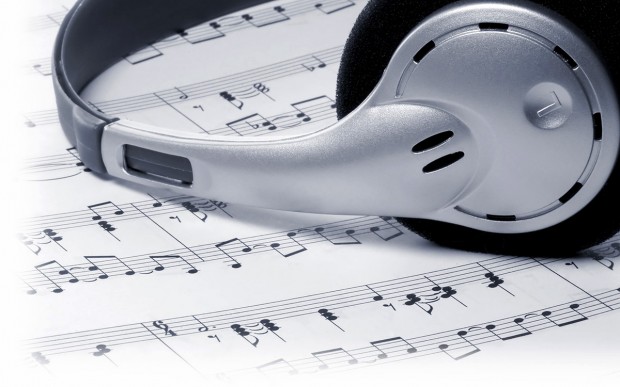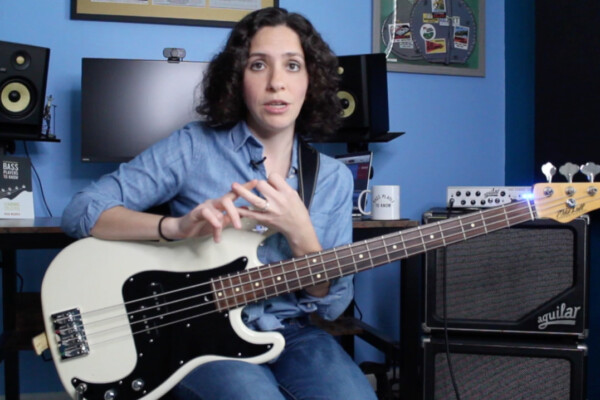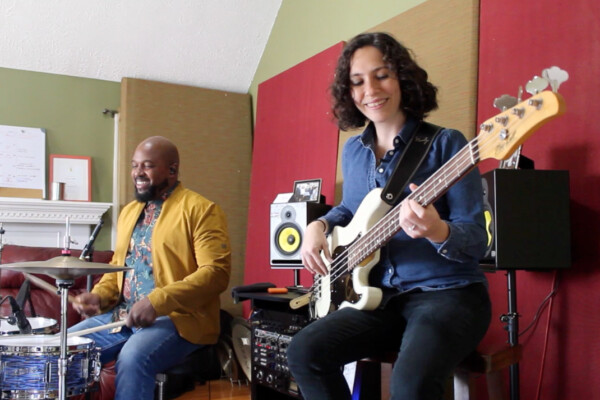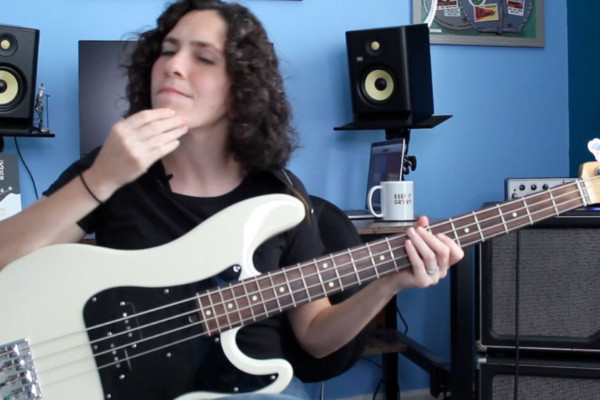Developing Your Musical Ear

Q: My problem is that I dont have “ears” for music. I’ve always tried and failed, and this is frustrating me. I only play what is written, or what somebody played. I want to play my own bass lines for any song of my choice. I’ve learned scales, modes, appregios… I’m not sure what to try next.
A: I know exactly where you are coming from. Many of you already know that bass was my second love. I started as a drummer and switched majors in college (from drums to bass). When I made the transition and focused on my bass playing, I could read well and knew all of my scales, but I had never played with other people. I had only read music from books and played along with albums (reading from books of transcriptions). I had never even figured out more than a few bass lines on my own.
I actually thought that there were people who wrote the music out and then people who performed it. It never occurred to me – as a kid – that people had improvised those bass lines and then someone else transcribed them later!
Without hearing you play, I’d suggest a few things to try to get started down the path.
1. Play with other people
Please, do not think that you have to get it all figured out before you sit down with others to make music. The biggest part of (almost) everyone’s development when they start happens while playing music with others. And everyone is usually sucking at making music, but it’s not about that. It’s about having fun and exploring this thing to the fullest.
Save the nerves for the big gigs later on. Have fun and suck at playing music for a while. If you don’t suck, then you are already ahead of the curve! When you are starting out, there are no wrong answers (or notes), only exploration. It is through discovering what doesn’t work that leads us to what does work.
It is critically important that you continue to try and make up bass lines with other humans. At least jam with a drummer (just the two of you), which is a great place to start.
Don’t feel like you have to bust out with a fully formed bass line by beat one, either. Start with a root and a quarter note and build it from there. Play around with your scales and pentatonics. See what sounds good to you.
2. Transcribe
Figure out the bass lines to the songs you love by ear. Write them out, if you like. This is great for ear training, but it also serves to help you study what others did before you.
Once you’ve figured out a line, think about it and how it applies to the key or chord changes that you are playing over. What scale degrees are they using and where? What shapes are they playing and how do they sound? Break it down.
3. Branch out
The challenges you’re facing may be due to a lack of internalization. If this is the case, learning to dance and/or sing may be exactly what you need. Learning to vocalize melody and grooves, or learning to simply move in time with the music can be immensely useful when figuring out how to play that music. When I first started playing Latin music, I would ask different musicians how to feel this or that, how to internalize this rhythm or that clave, etc. The answer I got more often than not was to “take some dance lessons and then feel it from the inside out”. Makes perfect sense when you think about it.
4. Create Loops for Practice
Take a computer or your favorite device and create drum loops and chord loops and simply practice grooving over them.
Remember this: there is a tendency to overplay when you are searching for what to play. Simpler is better, especially when it comes to grooving. Rhythm and feel trumps notes.
Don’t worry about melodic patterns until you can make root and 5th feel good.
When I was a kid, I used to hate practicing my scales so instead of just playing them as a steady stream of 8th notes, I would try and make them funky. I would play the major scale pattern, for example, but I would try and make it groove. If you can make a major scale groove, you can make anything groove!
My last word of advice is this: it isn’t a race. Be patient but also be persistent and practice hard. It will come!
How about you, readers? How did you first start developing your own lines and grooves? Tell us about it in the comments.
Have a question for Damian Erskine? Send it to [email protected]. Check out Damian’s instructional books, Right Hand Drive and The Improviser’s Path.




Great article. Nice closing words too. I appreciate that a lot, because I’m struggling with the instrument.
One thing that I find very use full and fun is to sing along, try to sing what you play while playing it, you can also try to sing and than play what you sang
good advice..especially the dance lessons and. playing with a drummer develops a sense of rhythym. most of all forget everything you ever learned and just groove..it’ll come..good luck bro
Great article! I’m the opposite. I can and have created my own bass lines, and I practice them all the time. I don’t know if it’s wrong to feel like this, but I prefer to create my own bass lines than learn a bass line from an established song, because I can’t read music…yet.
Sometimes, teaching and learning about music studies isn´t related to music itself, but with our attitude. Great article, as always!
Very inspiring!